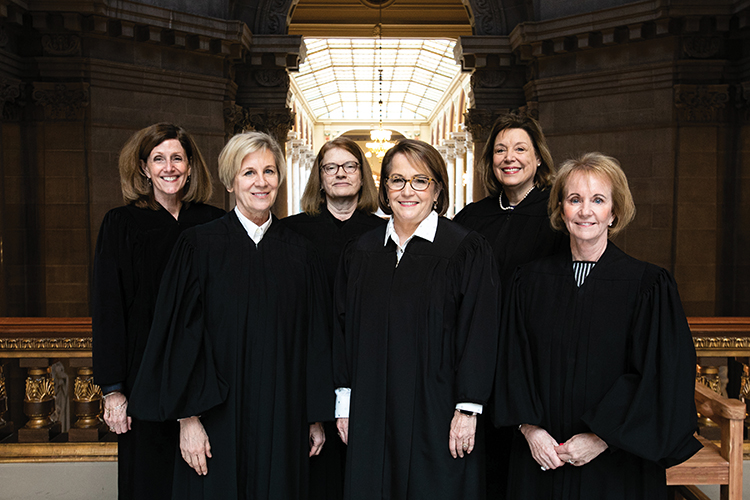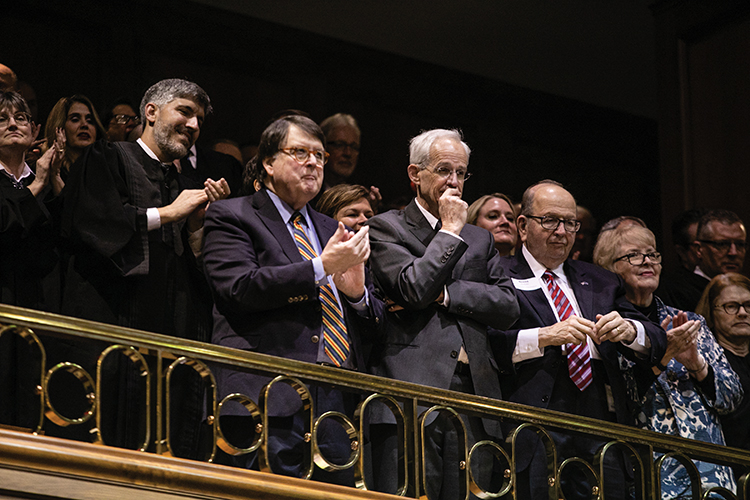James F. Maguire, Staff Attorney | Office of Court Services
The Judiciary in 2020
As we take measure of where we are and where we are going, it’s good to see where we’ve been and how much has been accomplished. Twenty years ago, Chief Justice Randall Shepard highlighted in the State of the Judiciary areas where Indiana courts could make a difference.
Helping people in need of a lawyer who can’t afford one
As Chief Justice Shepard observed: “People all too often find themselves in need of a lawyer, and the poorest of our citizens cannot afford to pay what the economics of modern lawyering requires.” So, moving beyond just encouraging lawyers to perform pro bono legal work, on January 1, 2005, the Indiana Supreme Court adopted Professional Conduct Rule 6.1: “A lawyer should render public interest legal service.”
The Court followed up with Professional Conduct Rule 6.7 that requires attorneys to report pro bono legal activity when submitting their annual registration. In 2017, 8,400 attorneys contributed over 442,000 hours in civil legal aid at no or reduced costs and donated almost $2 million in cash or in-kind tangible property.
The legal profession also provides help through Interest on Lawyers Trust Accounts (IOLTA), managed by the Indiana Bar Foundation. Since its inception in 1997, this program has generated over $17 million in support of civil legal aid to the poor.
Supporting parents & children to maintain strong families
Parent/child visitation along with domestic and family violence were two of the major family issues facing the courts.
In 2000, child visitation orders were drafted from an adult perspective with all the charm and humanity of a railroad schedule, according to Shepard. To redirect the focus, the Supreme Court adopted Parenting Time Guidelines to give children frequent, meaningful, and continuing contact with each parent. They are designed to develop parenting plans that focus on the child, while adapting to a parent’s situational change and the maturity of a child.
Victims of domestic and family violence are now able to find help through the Protection Order E-Filing Service, which quickly and efficiently captures the data needed for a court order of protection. Its features include an “escape” button that immediately saves entered data and safely exits the portal; contact information for the nearest advocate agency; direct 24/7 access to the National Domestic Violence Hotline; and, the option to receive notifications when the court order is granted, served, or close to expiration.
Creating opportunities for minorities & women

The Indiana Conference for Legal Education Opportunity supports minority students who aspire to pursue a law degree and legal career in our state. Since the program’s beginnings in 1997 through the 2016 Summer Institute, 547 ICLEO participants have become certified fellows, and 394 have gone on to graduate from law school, with 269 of those graduates now admitted to the practice of law.
Women are in the majority this academic year at both Indiana University Maurer School of Law and University of Notre Dame Law School. And, of the 816 law students at IU McKinney Law School, just under half (382) are women.
On January 15, 2019, the General Term of the Marion County Superior Courts elected four women to their Executive Committee for the first time ever. Judge Heather Welch serves as the Presiding Judge; and, Judges Alicia Gooden, Amy Jones, and Christina Klineman join her as Associate Presiding Judges.
Allen County Superior Court Judge Frances Gull, serving on the first-ever majority female bench, commented: “The climate is different today. There are more women in the law.”
In the United States District Court for the Southern District of Indiana, four former Marion County trial court judges are serving: Judge Sarah Evans Barker, Judge Tanya Walton Pratt, and Chief Judge Jane Magnus-Stinson. Judge Robyn Moberly serves as the Chief Judge of the Bankruptcy Court in the Southern District.
In the Northern District, two female Judges currently serve: Judge Holly Brady and Judge Theresa Lazar Springmann, who serves as its Chief Judge.
Six female judges currently serve on the Indiana Court of Appeals, including outgoing Chief Judge Nancy Vaidik, and Judges Patricia Riley, Melissa May, Margret Robb, Elaine Brown, and Elizabeth Tavitas. Judge Martha Wentworth presides on the Indiana Tax Court.
Chief Justice Loretta Rush serves as Indiana’s first female Chief Justice and delivered her sixth State of the Judiciary in 2020.

Creating more efficient courts while solving complex legal issues
Courts no longer close their doors at the end of the day, providing court access after-hours with the ability to pay fines and file cases, among other services. Today, 87% of the state’s new caseload is in one central court case management system and is accessible online at mycase.in.gov without charge. Over a half-million documents are electronically filed each month. Courts are able to send text messages to criminal defendants reminding them of their next court hearing.
The Court streamlined administrative functions through the Office of Judicial Administration under the leadership of a Chief Administrative Officer. The Court also continues to effectively utilize judicial resources by focusing on areas of need given the surge of new filings, especially drug and child welfare cases. The Supreme Court adopted a rule that allows judges to operate across county lines to provide assistance where needed and to develop regional drug or veterans courts. These problem-solving courts require pioneering judges, supportive communities, and tremendous training resources.
The Court is committed to rigorous education and training programs for judges and their staff. Indiana University Vice President for Research Fred Cate described Indiana’s judicial branch training as “one of the most robust in the nation.”
Indiana courts have a proven track record of success in areas including evidence-based decision-making, pretrial release, problem-solving courts, commercial courts, and an outstanding statewide technology platform.
The Supreme Court launched the Indiana Innovation Initiative in November to explore ways to make Indiana’s system of justice more efficient, less expensive, and easier to navigate while continuing to ensure that justice is fairly administered and the rights of all litigants are protected.
A lot has been accomplished in the past twenty years, and the future looks even brighter.